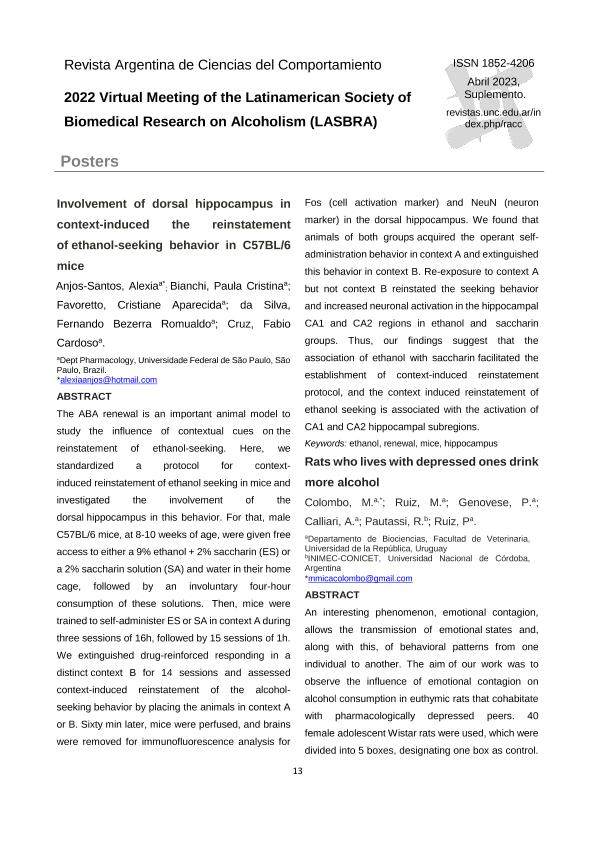Mostrar el registro sencillo del ítem
dc.contributor.author
González Ponce, Bella
dc.contributor.author
Dacosta Sánchez, Daniel
dc.contributor.author
Vera, Belén del Valle

dc.contributor.author
Pilatti, Angelina

dc.contributor.author
Pautassi, Ricardo Marcos

dc.contributor.author
Parrado González, Alberto
dc.contributor.author
Fernández Calderón, Fermín

dc.date.available
2023-09-22T16:40:38Z
dc.date.issued
2023
dc.identifier.citation
Perceived vulnerability and intention of use protective behavioral strategies among Spanish young adults: The mediating role of drinking motives; II Virtual Meeting of the Latin American Society for Biomedical Research on Alcoholism; Córdoba; Argentina; 2022; 26-26
dc.identifier.issn
1852-4206
dc.identifier.uri
http://hdl.handle.net/11336/212739
dc.description.abstract
Perceived vulnerability to alcohol consequences, a central factor in Protection Motivation Theory can motivate people to adopt health-protective behavior. However, systematic review showed that perceived vulnerability is a poor predictor of intention and behavior. From a motivational perspective on alcohol use, perceived vulnerability can be affected by reasons people have drinking. For example, previous studies showed that drinking motives predict perceived vulnerability, and drinking motives are associated with high protective behavioral strategies (PBS) use. Thus, drinking motives would explain the relationship between perceived vulnerability and intention to use PBS. The present study examines if drinking motives (social, enhancement, coping, and conformity) mediate the relationship between perceived vulnerability and intention to use PBS. Prospective design with a baseline assessment and a 2-month follow-up. We recruited 328 young adults (age: M = 21.15; SD = 2.23) who completed questionnaires to measure perceived vulnerability to negative consequences when consuming alcohol, and when getting drunk and drinking motives at baseline, and intention to use PBS at follow-up. Mediation analyses showed that higher perceived vulnerability was related to higher positive motives (social and enhancement), which was related to lower intention PBS use. Negative motives for drinking (coping and conformity) did not mediate this relationship. Our findings support the usefulness of correcting self-perceptions risk of alcohol use in interventions aimed at reducing alcohol-related harm in young adults, and drinking positive motives should be included as a component of these interventions.
dc.format
application/pdf
dc.language.iso
eng
dc.publisher
Consejo Nacional de Investigaciones Científicas y Técnicas. Instituto de Investigaciones Psicológicas; Asoiación Argentina de Ciencias del Comportamiento
dc.rights
info:eu-repo/semantics/openAccess
dc.rights.uri
https://creativecommons.org/licenses/by/2.5/ar/
dc.subject
PERCEIVED VULNERABILITY
dc.subject
ALCOHOL
dc.subject
DRINKING MOTIVES
dc.subject
INTENTION
dc.subject
PROTECTIVE BEHAVIORAL STRATEGIES
dc.subject.classification
Otras Psicología

dc.subject.classification
Psicología

dc.subject.classification
CIENCIAS SOCIALES

dc.title
Perceived vulnerability and intention of use protective behavioral strategies among Spanish young adults: The mediating role of drinking motives
dc.type
info:eu-repo/semantics/publishedVersion
dc.type
info:eu-repo/semantics/conferenceObject
dc.type
info:ar-repo/semantics/documento de conferencia
dc.date.updated
2023-09-15T11:08:23Z
dc.journal.pagination
26-26
dc.journal.pais
Argentina

dc.journal.ciudad
Córdoba
dc.description.fil
Fil: González Ponce, Bella. Universidad de Huelva. Facultad de Ciencias de la Educación. Departamento de Psicología Clínica, Experimental y Sociale.; España
dc.description.fil
Fil: Dacosta Sánchez, Daniel. Universidad de Huelva. Facultad de Ciencias de la Educación. Departamento de Psicología Clínica, Experimental y Sociale.; España
dc.description.fil
Fil: Vera, Belén del Valle. Universidad Nacional de Córdoba. Instituto de Investigaciones Psicológicas. - Consejo Nacional de Investigaciones Científicas y Técnicas. Centro Científico Tecnológico Conicet - Córdoba. Instituto de Investigaciones Psicológicas; Argentina
dc.description.fil
Fil: Pilatti, Angelina. Universidad Nacional de Córdoba. Instituto de Investigaciones Psicológicas. - Consejo Nacional de Investigaciones Científicas y Técnicas. Centro Científico Tecnológico Conicet - Córdoba. Instituto de Investigaciones Psicológicas; Argentina
dc.description.fil
Fil: Pautassi, Ricardo Marcos. Consejo Nacional de Investigaciones Científicas y Técnicas. Centro Científico Tecnológico Conicet - Córdoba. Instituto de Investigación Médica Mercedes y Martín Ferreyra. Universidad Nacional de Córdoba. Instituto de Investigación Médica Mercedes y Martín Ferreyra; Argentina
dc.description.fil
Fil: Parrado González, Alberto. Universidad de Huelva; España
dc.description.fil
Fil: Fernández Calderón, Fermín. Universidad de Huelva. Facultad de Ciencias de la Educación. Departamento de Psicología Clínica, Experimental y Sociale.; España
dc.relation.alternativeid
info:eu-repo/semantics/altIdentifier/url/https://revistas.unc.edu.ar/index.php/racc/article/view/41065/41164
dc.conicet.rol
Autor

dc.conicet.rol
Autor

dc.conicet.rol
Autor

dc.conicet.rol
Autor

dc.conicet.rol
Autor

dc.conicet.rol
Autor

dc.conicet.rol
Autor

dc.coverage
Internacional
dc.type.subtype
Reunión
dc.description.nombreEvento
II Virtual Meeting of the Latin American Society for Biomedical Research on Alcoholism
dc.date.evento
2022-10-21
dc.description.ciudadEvento
Córdoba
dc.description.paisEvento
Argentina

dc.type.publicacion
Journal
dc.description.institucionOrganizadora
Latin American Society for Biomedical Research on Alcoholism
dc.source.revista
Revista Argentina de Ciencias del Comportamiento
dc.date.eventoHasta
2022-10-23
dc.type
Reunión
Archivos asociados
